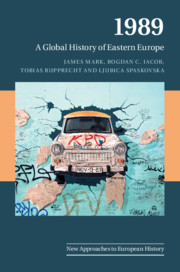6. - A World without ‘1989’
Published online by Cambridge University Press: 29 August 2019
Summary
‘1989’ marked the start of an era of Westernization and liberalization. The disillusionment with this politics of convergence began in Russia in the mid-1990s, and then reached Eastern Europe a decade later. The economic crisis of 2008 broke faith in the superiority of the Western model, whilst accession to the European Union removed the political conditionality that had previously disciplined local politics. Powerful illiberal movements, in alliance with populist authoritarians in the West, challenged the naturalisation of liberalisation. The migration of their populations westwards and the ‘migrant crisis’ from 2015 sparked fantasies of demographic catastrophe. Against this background, such movements presented the East as the ‘true Europe’, defending its whiteness, Christianity, and heterosexuality against extra-European immigrants and a decadent West. They looked to new alliances with authoritarian and populists in China, Turkey, and the United States too. In so doing such populists reimagined their region’s place beyond Western-style politics, EU conditionality, and a Euro-Atlantic space. There was significant resistance though: EU officials, local centrist parties, and civic mobilizations continued to embrace 1989 as a symbol of unfulfilled hopes of democratic transformation.
Keywords
- Type
- Chapter
- Information
- 1989A Global History of Eastern Europe, pp. 266 - 311Publisher: Cambridge University PressPrint publication year: 2019



